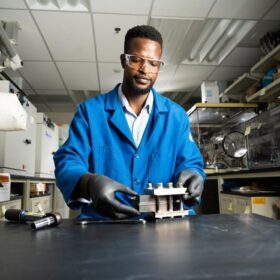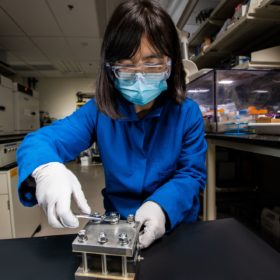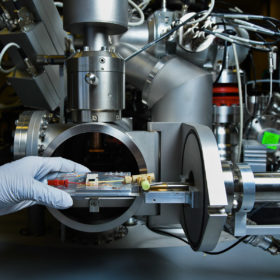Iron-based redox flow battery for grid-scale storage
Researchers in the U.S. have repurposed a commonplace chemical used in water treatment facilities to develop an all-liquid, iron-based redox flow battery for large-scale energy storage. Their lab-scale battery exhibited strong cycling stability over one thousand consecutive charging cycles, while maintaining 98.7% of its original capacity.
New US license to bring vanadium redox flow batteries to market
The US Department of Energy’s Pacific Northwest National Laboratory has made a third semi-exclusive commercial license for vanadium redox flow battery technologies, in order to help bring the technology to market.
Observing silicon anodes in action
Scientists in the United States working with silicon anodes for lithium-ion batteries have managed to model key mechanisms that lead to fast developing performance loss in the anodes. Understanding what causes the silicon to swell up and subsequently fall apart, the scientists say, is an important step to preventing it, and producing long lasting, high-capacity batteries.
Carbon nanotubes pave the way for silicon in storage
Scientists in the United States have developed a carbon nanotube method of fabricating a lithium-ion battery with a silicon anode. The device reportedly demonstrated better than 87% capacity retention after 1,500 cycles. The developers say their discovery overcomes many of the obstacles to the use of silicon as an anode and could open up the use of other materials for electrodes in lithium-ion devices.
A new battery mix to prevent dendrites
Scientists at the United States Pacific Northwest National Laboratory have discovered a root cause of dendrite formation, which can cause battery failure and even fires in lithium-ion technology. With this new knowledge, the group is now working on electrolyte recipes that eliminate dendrite growth entirely.
Researching some cool new battery materials
Scientists from China and the United States have developed an additive for electrolyte materials they say could improve the operating temperature range for lithium-ion batteries, allowing them to operate down to minus 40 degrees Celsius without compromising performance at temperatures up to 60 degrees Celsius.





